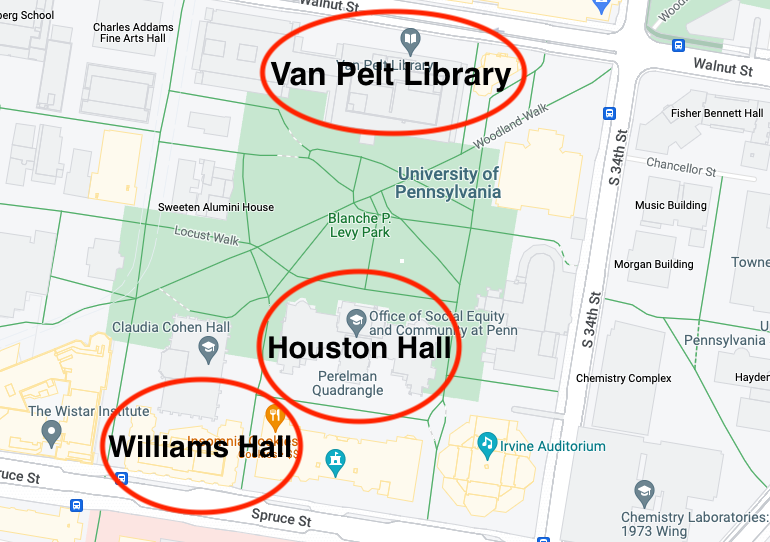Schedule
- Before the class
- Technology
- What else do you want to talk about?
- Software Suggestions
- ALL MIRO BOARDS LINK
- Location
- Monday, June 13
- Tuesday, June 14
- Wednesday, June 15
- Thursday, June 16
Before the class
- Please sign on to the Discord server for the course (invitations are in your email.)
- Please sign up for a free account on Miro, the virtual whiteboard system that we will be using extensively during the course. (Invite links to our Miro space are in your email.)
- Please follow the instructions to install OpenRefine on your own computer.
- We have a relatively short reading for each day of the course - as with all classes, it’ll be most helpful for you to do the reading prior to our discussion!
Technology
You’ll need to bring your own computer - Windows, Mac, Linux are all fine.
I’ve tried hard to make sure that this class uses the least amount of tech possible. Almost all of our work will happen in apps that run in your internet browser; only OpenRefine needs to be installed beforehand.
However, Palladio and OpenRefine are not designed to work on a tablet. I strongly recommend that you use a laptop computer to get the most useful experience with those exercises. You may also find it much easier to use them, and the Miro whiteboard app, if you use a computer mouse (but this isn’t required.)
What else do you want to talk about?
I’ve left flex time on Thursday to talk through issues or questions that aren’t covered in the other modules. At any time Monday through Wednesday, use the Open Questions Board to drop notes about concepts or questions you’d like to learn more about, and then based on community voting we’ll hold some informal discussions or tutorials on Thursday.
Software Suggestions
Miro board to collect software suggestions for data tidying, management, and visualization
ALL MIRO BOARDS LINK
Location
All Tidy Data classes take place in Williams 616

Monday, June 13
Reading
Rawson, Katie, and Trevor Muñoz. “Against Cleaning.” In Debates in the Digital Humanities 2019, edited by Matthew K. Gold and Lauren F. Klein, 279–92. University of Minnesota Press, 2019. DOI: 10.5749/j.ctvg251hk.26.
Schedule
| Time | Activity |
|---|---|
| 9:00am-10:00am | Dream Lab Welcome |
| 10:00am-10:45am | Tidy Data Orientation & Introductory Exercise |
| 10:45am-11:00am | Break |
| 11:00am-12:00pm | Data types (text, numbers, dates, categories, missing & uncertain info) |
| 12:00pm-1:30pm | Lunch |
| 1:30pm-3:00pm | Palladio |
| 3:00pm-3:30pm | Break |
| 3:30pm-4:30pm | Rawson & Muñoz 2019 discussion |
| 5:15pm-6:45pm | Keynote: “Digital Humanities, 1887/2087” Whitney Trettien (Van Pelt Library, 6th Floor, Class of 1978 Pavilion) |
Tuesday, June 14
Reading
Merry, Mark. Designing Databases for Historical Research. London: Institute of Historical Research, University of London, 2015. http://port.sas.ac.uk/mod/book/view.php?id=75. (Sections C, D & E)
Schedule
| Time | Activity |
|---|---|
| 9:30am-10:30am | Relational Data Design Intro and discussing Merry 2015 |
| 10:30am-10:45am | Break |
| 10:45am-12:00pm | Data design exercise |
| 12:00pm-1:30pm | Lunch |
| 1:30pm-3:00pm | Intro to SQL (selecting; ordering; filtering; counting) |
| 3:00-3:30 | Break |
| 3:30pm-5:00pm | More SQL (creating schemas; joins) |
Wednesday, June 15
Reading
Posner, Miriam. “What’s Next: The Radical, Unrealized Potential of Digital Humanities.” Miriam Posner’s Blog (blog), July 27, 2015. https://miriamposner.com/blog/whats-next-the-radical-unrealized-potential-of-digital-humanities/.
Schedule
| Time | Activity |
|---|---|
| 9:30-10:30am | Posner 2015 discussion |
| 10:30am-10:45am | Break |
| 10:45am-12:00pm | Identifying data messes |
| 12:00pm-1:30pm | Lunch |
| 1:30pm-3:00pm | OpenRefine |
| 3:00pm-3:30pm | Break |
| 3:30pm-5:00pm | OpenRefine continued |
Thursday, June 16
Reading
Langmead, Alison, and David Newbury. “Pointers and Proxies: Thoughts on the Computational Modeling of the Phenomenal World.” In The Routledge Companion to Digital Humanities and Art History, edited by Kathryn Brown, 358–73. Routledge Art History and Visual Studies Companions. New York: Routledge, 2020. DOI: 10.4324/9780429505188-31. (PDF)
Schedule
| Time | Activity |
|---|---|
| 9:30am-10:15am | Langmead & Newbury 2020 discussion |
| 10:15am-10:30am | Break |
| 10:30am-12:00pm | Data documentation & preservation |
| 12:00pm-1:30pm | Lunch |
| 1:30pm-3:00pm | Open session |
| 3:15-5:00pm | Dream Lab Wrap-up Session |